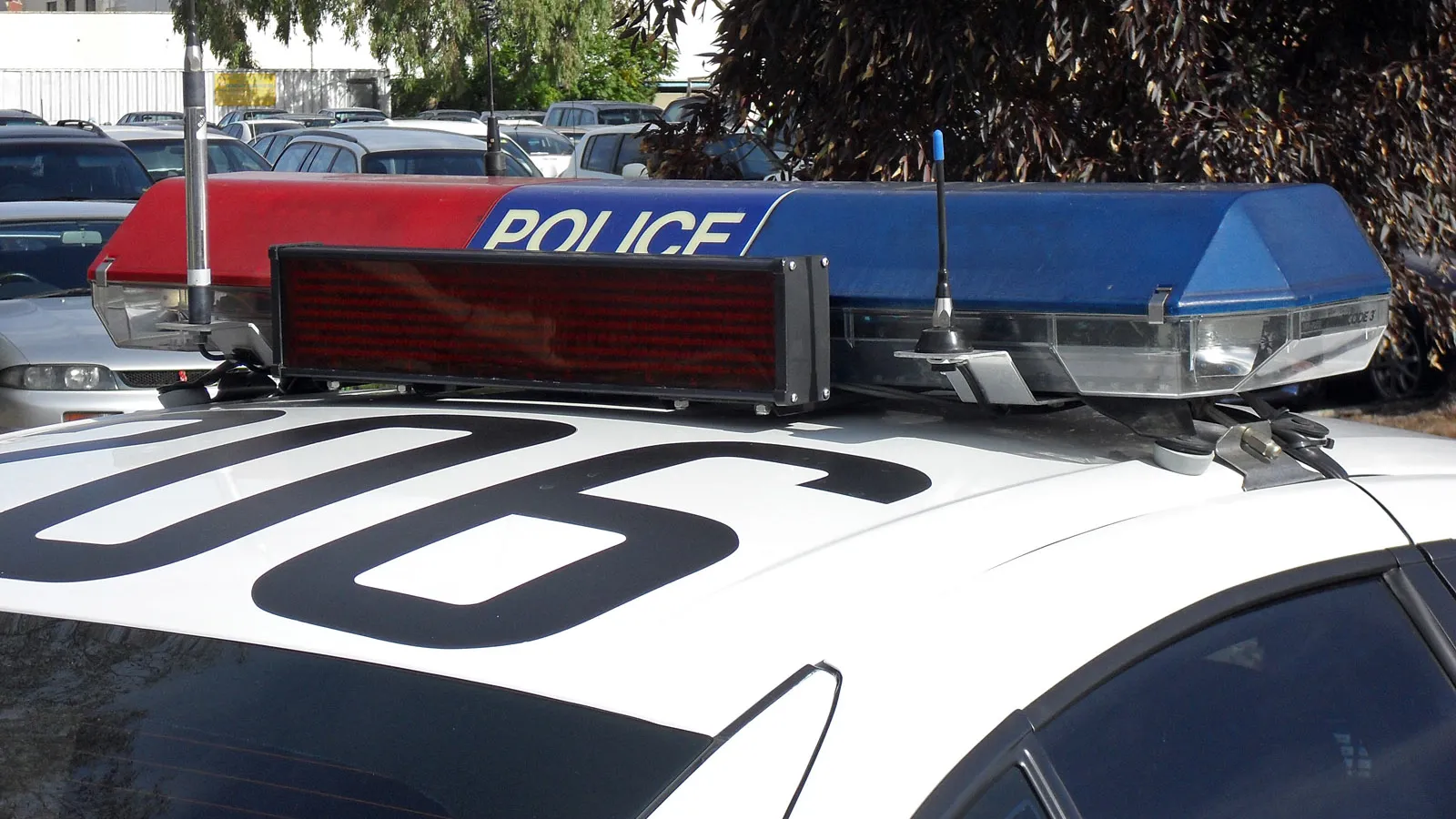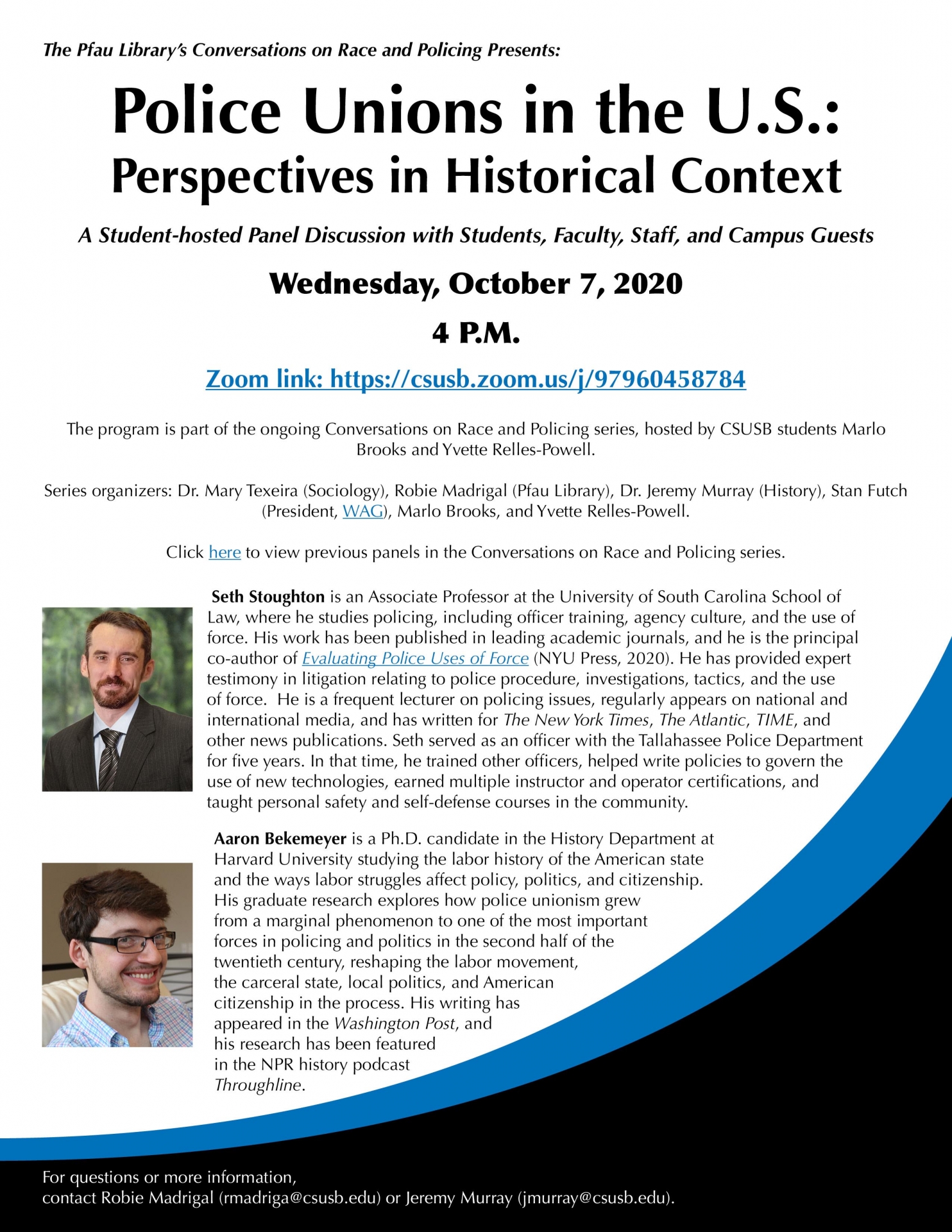Joe Gutierrez | CSUSB Office of Strategic Communication | (951) 236-4522 | joeg@csusb.edu

The history of police unions in the United States will be the topic at the next Conversations on Race and Policing presentation at 4 p.m. Wednesday, Oct. 7, presented by Cal State San Bernardino’s John M. Pfau Library.
“Police Unions in the U.S.: Perspectives in Historical Context” will take place virtually at 4 p.m. Wednesday, Oct. 7.
The program can be accessed from a PC, Mac, Linux, iOS or Android at https://csusb.zoom.us/j/97960458784.
This will be the 19th event in the series that began in June.
Panelists for the Oct. 7 conversation will be:
- Seth Stoughton, associate professor at the University of South Carolina School of Law, where he studies policing, including officer training, agency culture, and the use of force. His work has been published in leading academic journals, and he is the principal co-author of “Evaluating Police Uses of Force” (NYU Press, 2020). He has provided expert testimony in litigation relating to police procedure, investigations, tactics, and the use of force. He is a frequent lecturer on policing issues, regularly appears on national and international media, and has written for The New York Times, The Atlantic, TIME and other news publications. Stoughton served as an officer with the Tallahassee Police Department for five years. In that time, he trained other officers, helped write policies to govern the use of new technologies, earned multiple instructor and operator certifications, and taught personal safety and self-defense courses in the community.
- Aaron Bekemeyer, a Ph.D. candidate in the history department at Harvard University studying the labor history of the American state and the ways labor struggles affect policy, politics, and citizenship. His graduate research explores how police unionism grew from a marginal phenomenon to one of the most important forces in policing and politics in the second half of the 20th century, reshaping the labor movement, the carceral state, local politics, and American citizenship in the process. His writing has appeared in The Washington Post, and his research has been featured in the NPR history podcast Throughline.
Conversations on Race and Policing began in the aftermath of the May 25 death of George Floyd while in the custody of four Minneapolis, Minn., police officers. A video of the incident posted on social media has led to widespread protests, the firing of four police officers, the arrest of one officer on a second-degree murder charge, the other three on charges of aiding and abetting second-degree murder – and a spotlight worldwide on race and policing.
Previous forums also are posted online (more recordings will soon be available for viewing) on the CSUSB History Club Lecture Series YouTube channel:
- “Race and Policing, A Panel Presentation and CSUSB Campus Conversation” on June 3;
- “Conversations on Race and Policing (2), CSUSB Panel Presentation and Discussion” on June 10;
- “Conversations on Race and Policing (3), CSUSB Panel Presentation and Discussion” on June 17;
- “Conversations on Race and Policing (4), CSUSB Panel Presentation and Discussion” on June 24;
- “Conversations on Race and Policing (5), CSUSB Panel Presentation and Discussion” on July 1;
- “Conversations on Race and Policing (6), CSUSB Panel Presentation and Discussion” on July 8;
- “Conversations on Race and Policing (7), CSUSB Panel Presentation and Discussion,” on July 15;
- “Conversations on Race and Policing (8), CSUSB Panel Presentation and Discussion,” on July 22;
- “Conversations on Race and Policing (9), CSUSB Panel Presentation and Discussion,” on July 29;
- “Conversations on Race and Policing (10), CSUSB Panel Presentation and Discussion,” on Aug. 5, which discusses in detail what “defunding” and “abolishing” police mean, beyond the political rhetoric, with Alex S. Vitale, author and professor of sociology at Brooklyn College, coordinator of the college’s Policing and Social Justice Project, and author of “The End of Policing; ”
- “Conversations on Race and Policing (11), CSUSB Panel Presentation and Discussion,” on Aug. 12;
- “Conversations on Race and Policing (12), CSUSB Panel Presentation and Discussion,” on Aug. 19, and
- “Conversations on Race and Policing (13), CSUSB Panel Presentation and Discussion,” on Aug. 26.
On June 16 the College of Arts and Letters presented “Structural Racism, Civil Disobedience, and the Road to Racial Justice in the Age of COVID-19,” which is also posted on YouTube.
The university’s June 9 memorial for Floyd also focused on the Black Lives Matter movement.
And, related to the university’s conversations series, Netflix is making the 2016 Ava DuVernay film, “13th,” available for free on its YouTube channel. Combining archival footage with testimony from activists and scholars, director Ava DuVernay’s examination of the U.S. prison system looks at how the country’s history of racial inequality drives the high rate of incarceration in America.
The ongoing Conversations on Race and Policing series is hosted by CSUSB students Marlo Brooks and Yvette Relles-Powell.
The series is organized by Brooks and Relles-Powell, CSUSB faculty members Mary Texeira (sociology) and Jeremy Murray (history), Robie Madrigal, public affairs/communication specialist for the CSUSB John M. Pfau Library, and community member Stan Futch, president of the Westside Action Group.
For more information, contact Robie Madrigal at rmadriga@csusb.edu or Jeremy Murray at jmurray@csusb.edu.
